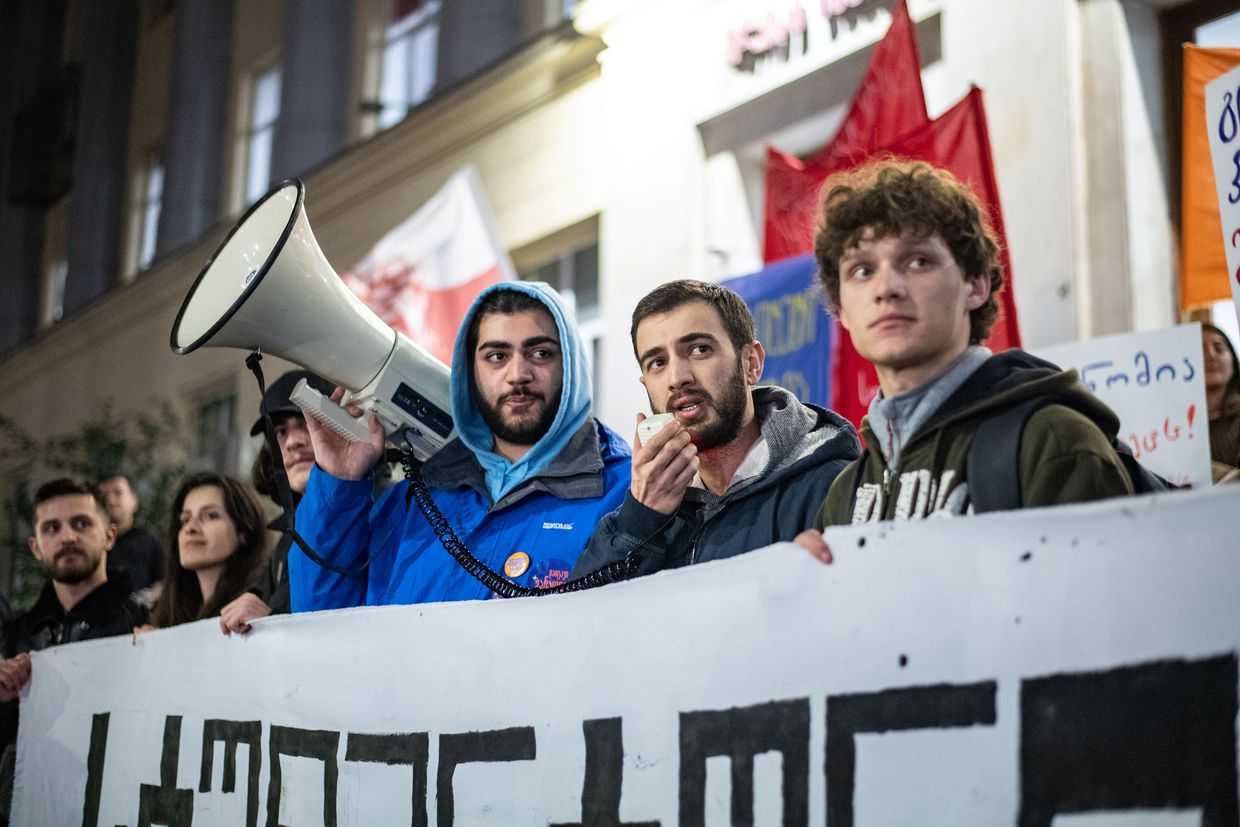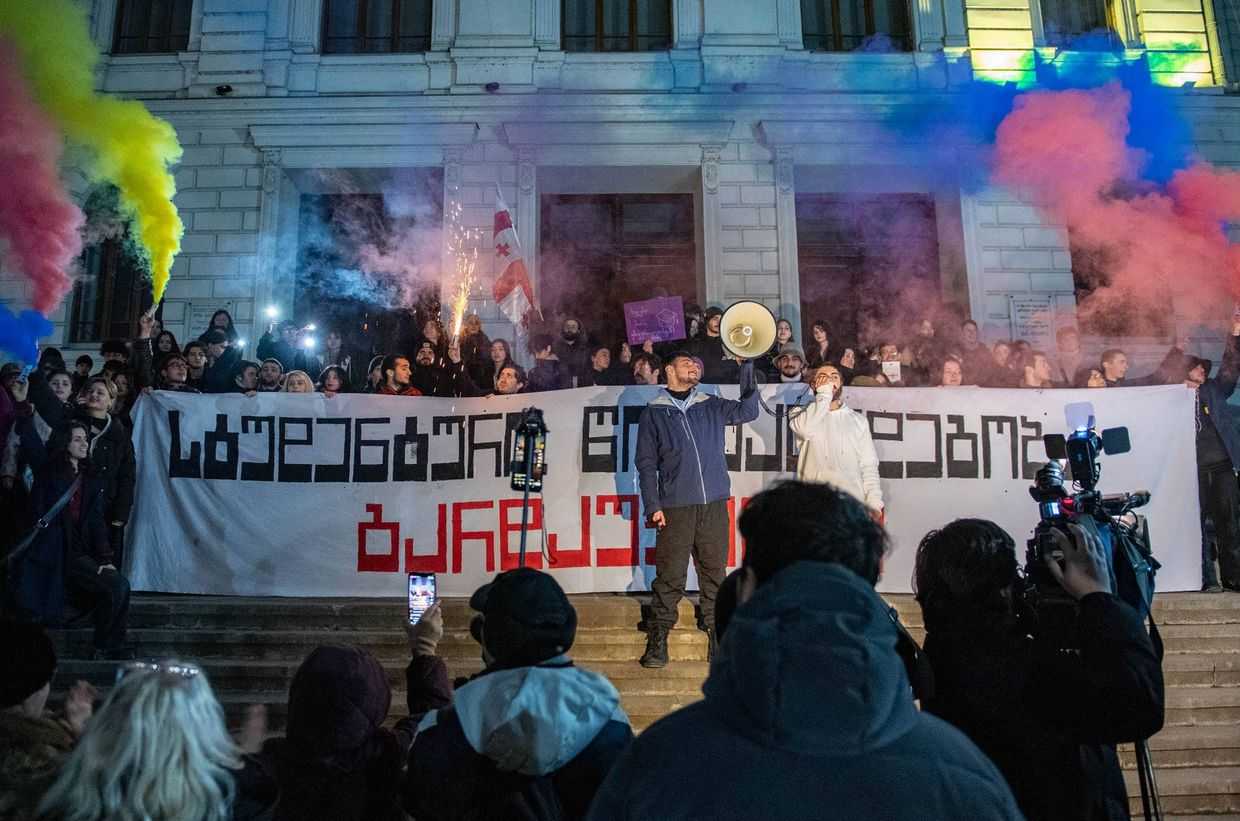
Georgia’s opposition is calling for the resignation of a ruling party MP, after two MPs made insulting statements towards female opposition MPs in parliament.
During a plenary session on Tuesday, Georgian Dream MPs Aluda Ghudushauri and Irakli Beraia accused Ana Tsitlidze and Teona Akubardia of, respectively, being unattractive to former President Mikheil Saakashvili and having ‘a long tongue that has been everywhere’.
Ghudushauri, who is the first deputy chair of the Human Rights and Civil Integration Committee, described Saakashvili as ‘deprived of dignity and morals’, having sarcastically discussed Saakashvili’s opening of an office in Tbilisi on 11 October, after which United National Movement’s Ana Tsitlidze called Ghudushauri a ‘moron’.
In an extensive pejorative response, Ghudushauri repeatedly described Tsitlidze as ‘a crap woman’ who ‘couldn’t even get on the list of women who Saakashvili [found attractive]’.
‘Get out of here now […] you crap person, […] worthless, crap [person]’, he said.
Irakli Beraia, chair of the Defence and Security committee, similarly launched a personal attack on MP Teona Akubardia, a member of the parliamentary ‘Reform Group’ and one of the committee’s deputy chairs, after she discussed the proposed deployment of the Russian permanent military fleet in Abkhazia.
[Read on OC Media: Russia to establish naval base in Abkhazia]
Beraia responded by calling her a ‘shameless and disgraceful liar’, before claiming that Akubardia had missed meetings at the NATO Parliamentary Assembly because she was ‘hungover and too lazy to raise her head from the pillow’. He added that Akubardia’s true motivation for raising the issue and criticising the Defence Committee was that she was ‘not given the opportunity to use various platforms for disinformation, to take selfies with others like her and to post on Facebook’, ‘to go into airport lounges, […] to get wasted and lie around’.
‘I urge this person to refrain from mentioning me and my committee with her long tongue that has been everywhere.’
While ‘having a long tongue’ is commonly used in Georgian to mean gossiping or speaking ill of others, the second half of the phrase was interpreted by many as a sexual insult.
On Wednesday, ruling party chair Irakli Kobakhidze told journalists that Beraia had meant that Akubardia’s ‘talk against state interests’ was widespread.
Speaker of Parliament Shalva Papuashvili did not react during the session, but afterwards stated that he took some responsibility for the incidents on himself.
‘When there are personal insults, I sometimes […] have to turn off the microphone’, said Papuashvili. ‘On some occasions, I may be late in this regard, but in any case, I, as the leader of the session, will certainly take this note that if there is a limit of personal insult [crossed], I will [in future] interrupt the speech of a person in time’.
Georgia’s President Salome Zurabishvili later expressed solidarity with the opposition MPs, and said that ‘today, I heard words that insult the Parliament of Georgia as a whole’.
‘I call on the Chair of the Parliament to take the strictest measures against those people who allowed themselves to act like this today, because if he does not do this, then he himself will lose face in parliament’, she claimed.
‘Perhaps they are missing something’
On the same day, female opposition MPs Teona Akubardia, Tina Bokuchava, Khatuna Samnidze, Tamar Kordzaia and Ana Natsvlishvili held a briefing and evaluated the statements made by Beraia as an attempt to discredit female MPs.
On Tuesday, Ana Tsitlidze wrote on Facebook that the parliamentary speaker ‘hears these insults and does not turn off the microphone’, and suggested that Ghudushauri would one day not be protected by parliamentary security, and would have ‘red paint smeared on his face’.
Baia Pataraia, the head of Georgian women’s rights organisation Sapari, told Mtavari that the statements were ‘sexual harassment’ and ‘not some ordinary insult’. Georgia’s former Human Rights Defender, Nino Lomjaria, wrote that ‘until the politicians responsible for the dirty attacks on women are harshly held accountable, no parliamentary politics makes sense’.
‘The politics of terrorising women must end!’, wrote Lomjaria.
Beraia stated later on Tuesday that he was ‘emotionally overwhelmed’ because of the ‘severity of the statements we hear all the time’, and that he wanted to ‘apologise for that’.
In contrast, Ghudushauri stated that he had nothing to apologise for, and that there was ‘no sexist statement’. He accused Tsitlidze of being ‘characterised by her offensiveness’.
‘Ani Tsitlidze crosses the line and it is bad that in many cases, we follow these provocations’, said Ghudushauri.
At Wednesday’s plenary session, opposition MPs demanded that Beraia leave his post, while Speaker Papuashvili stated that Beraia would not resign.
A number of ruling party figures defended their party members, with both party chair Irakli Kobakhidze and MP Beka Odisharia making reference to an occasion on which opposition female MPs Tina Bokuchava, Salome Samadashvili, Khatuna Samnidze and Tamar Kordzaia unfurled a banner in front of the tribune in parliament while Minister of Culture Tea Tsulukiani was giving a speech. The inscription on the banner read ‘Russian warship go fuck yourself’.
‘When a female MP comes out and calls male MPs ‘little men’, isn’t this a gender-motivated insult? Do you remember the word “sorry” being expressed towards the male MPs? Double standards are not appropriate’, said Kobakhidze. ‘Wasn’t Tea Tsulukiani a female politician when they unfurled the obscene banner?’
Odisharia, however, went on to make comments that were widely read as being sexual in their implications, stating that the banner with the instruction to ‘go fuck yourself’ (lit. go to dick) might be ‘something subconscious’, or that the female MPs might be ‘missing’ something.









